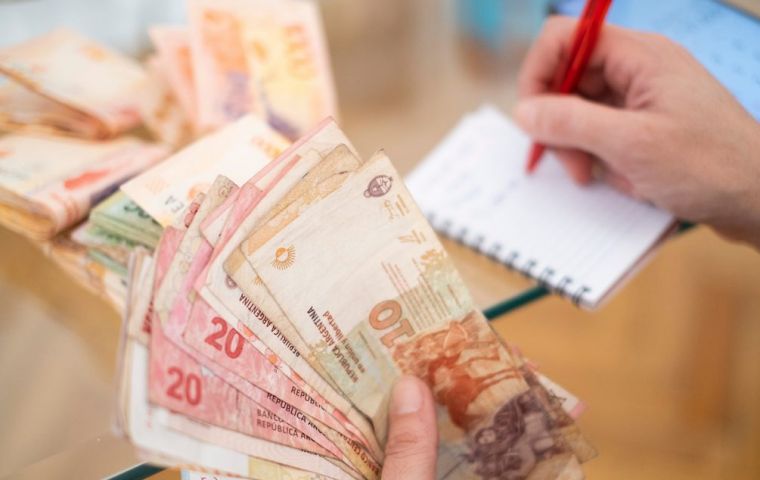MercoPress. South Atlantic News Agency
Argentine gov't orders 22% devaluation of the peso
 The “blue” dollar rose from AR$ 605 to AR$ 685 in one trading day
The “blue” dollar rose from AR$ 605 to AR$ 685 in one trading day The Government of Argentina Monday ordered a 22% devaluation of the national currency which stood at AR$ 365 / US$ 1 on the official market. Financial authorities also raised the interest rate from 97% to 118% annually, it was reported in Buenos Aires. Thus, the monthly rate will be 9.83% and the effective annual rate will be 209%.
These measures were announced after a significant loss for Economy Minister and presidential candidate Sergio Massa at Sunday's Open, Simultaneous, and Mandatory Primary (PASO) elections amid dwindling Central Bank (BCRA) reserves.
Last Wednesday, the “blue” (a euphemism for “black market”) dollar pierced the psychological barrier of $600 and on Friday closed at $605. On Monday it reached AR$ 685 but traded at over AR$ 690 at some point during the day after Libertarian (far right) Economist Javier Milei's victory.
It was “convenient to readjust the level of the interest rates of the monetary regulation instruments, in line with the recalibration of the level of the official exchange rate,” the BCRA said in a statement.
The decision was taken “in order to anchor exchange rate expectations and minimize the degree of pass-through to prices, to propitiate positive real returns on local currency investments and to favor the accumulation of international reserves,” it added.
“The BCRA will continue to monitor the evolution of the general price level, the dynamics of the financial and foreign exchange markets, and the monetary aggregates in order to calibrate its rate policy” and guarantee positive yields, meaning not lower than the expected inflation.
In this scenario, the AFIP tax bureau announced a reduction from 25% to 5% in surcharges to the so-called credit card (or Qatar) dollar, the rate applied to transactions abroad, which fell from AR$ 732 to AR$ 659.21 on Monday. Hence, the Qatar dollar now includes a 30% PAIS tax plus a 45% collection on account of Income and Personal Property Tax, and another 5% (instead of 25%) on account of Personal Property Tax.
“Did I issue pesos? Does Libertad Avanza have a program that implies increasing the issuance of pesos? It is not that the dollar rises, the peso loses purchasing power, when you generate excess supply because you issue, the demand for money falls and the peso loses value,” the Economist Milei explained in a radio interview. “The Government has just been slapped in the face,” he added before sentencing that “it is an oxymoron to say that the market is going up because I am pro-market.”




Top Comments
Disclaimer & comment rulesCommenting for this story is now closed.
If you have a Facebook account, become a fan and comment on our Facebook Page!